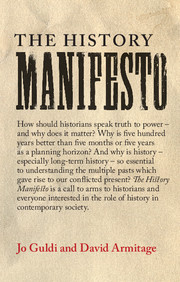Acknowledgements
The History Manifesto arose from many discussions about the future of history, the return of the longue durée, and the role of academics in public culture. Jo Guldi recalls Jeremy DuQuesnay Adams and David Nirenberg planting the seeds for the argument of the book; David Armitage likewise remembers exchanges with Alison Bashford and Darrin McMahon as pivotal for his own thinking. Conversation led to collaboration; a seminar-paper turned into an article; the article expanded into this book. We sandwiched work on it between many other personal and professional commitments: for their patience and support, Jo Guldi thanks especially Zachary Gates while David Armitage salutes the staff of the History Department at Harvard University. We are both grateful to Zachary Davis for efficient and imaginative research assistance.
We presented earlier versions of parts of our argument at Yale Law School, to the History Department at Brown University, and at Reid Hall in Paris. We are very grateful to the audiences on those occasions for their comments and encouragement, as well as to Jenny Andersson, Margy Avery, Omer Bartov, Peter Burke, Jennifer Burns, Harold Cook, Simon DeDeo, Matt Desmond, Paul Freedman, Stella Ghervas, John Gillis, Tom Griffiths, Lynn Hunt, Daniel Jütte, Jeremy Kessler, Dan Smail, Anna Su, John Witt, and Daniel Woolf for their reactions and responses. Our thanks also go to the editors of Annales, especially Etienne Anheim and Antoine Lilti, for help with an essay in their journal which draws upon material from Chapters 1 and 2.
The History Manifesto has been an unusually collaborative book, not just for the authors, but between them and Cambridge University Press. Richard Fisher, publishing visionary extraordinaire, supported our mission from the very beginning and from the summit of the Press. Without Liz Friend-Smith’s editorial energy, enthusiasm, and élan, the book would not have been started and certainly would not have been finished. Christina Sarigiannidou and Rosalyn Scott shepherded an unprecedentedly intense production schedule with calm and grace, Barbara Docherty was a model copy-editor during the same mad dash to the finish-line, and Caroline Diepeveen produced an excellent index in record time. The Press’s commitment throughout to open-access and online publication of The History Manifesto has been both innovative and inspirational. We welcome the broader discussion this experiment will open up: please join the conversation at historymanifesto.cambridge.org.

